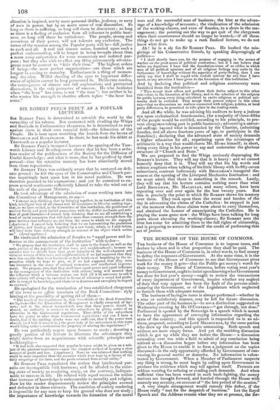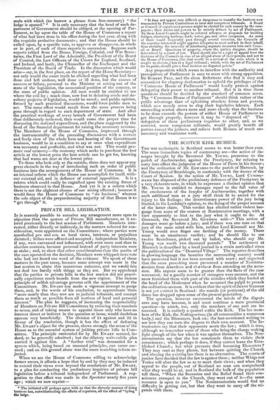THE BUSINESS OF THE HOUSE OF COMMONS.
THE business of the House of Commons is to impose taxes, and declare by whom and in what proportion they shall be paid. The business of the House of Commons is, in other words, to find money to defray the expenses of Government. At the same time, it is the business of the House of Commons to see that Government gives work for the money it gets—that the Public get money's worth for their money. The House of Commons, before voting next year's money to Government, ought to insist upon knowing what Government has done for last year's money—ought to review the transactions of every department of Government, inquire whether any neglect of duty that may appear has been the fault of the persons admi- nistering the Government, or of the Legislature which neglected to furnish them with adequate means.
The business of laying:on taxes is always performed—whether in a wise or satisfactory manner, may be left for future discussion. The other part of the business is—to use a distinction suggested on Wednesday evening by Mr. O'CosovErs.—" got through, not done." Parliament is opened by the Sovereign in a speech which is meant to have the appearance of conveying information regarding the state of the country ; and this speech is responded to in an ad- dress, prepared, according to Lord MELBOURNE, by the same parties who drew up the speech, and quite unmeaning. Both speech and address are mere empty forms. And yet the rambling discussion which is got up while they are before the House— a discussion extending over too ,wide a field to admit of any conclusion being arrived at—a discussion begun before any information has been
j given to the House to enable it to form a judgment on the topics discussed—is the only opportunity afforded by Government of can- vassing its general merits or demerits. No information is volun- teered by Government. When a Member of Parliament suspects any thing is wrong, he must begin by calling upon Government to produce the evidence which may tell against itself. Pretexts are seldom wanting for refusing or evading such demands. And when sufficient time has been wasted in such bush-fighting, the money matters are brought forward, and hurried through the House with scarcely any scrutiny, on account of " the late period of the session." A very simple arrangement would remedy this defect, if the House really " met for the despatch of business." Let the Royal Speech and the Address remain what they are at present, the for.
mula with which (to borrow a phrase from free-masonry) " the lodge is opened."' It is only necessary that the head of each de- partment of Government should be obliged, at the opening of Par- liament, to lay upon the table of the House of Commons a report of what had been done in his office during the last year, along with the requisite probative documents ; and that the House should be called upon, by a specific vote, to approve or disapprove, in whole or in part, of each of these reports in succession. Suppose such reports tabled from the Home, Foreign, Colonial, and War Secre- taries, the First Lord of the Admiralty, the President of the Board of Control, the Law Officers of the Crown for England, Scotland, and Ireland, and lastly, the Chancellor of the Exchequer and the President of the Board of Trade. In the discussion which would arise—say, in the first place, on the report of the Home Secretary— not only would the exact truth be elicited regarding what had been done and left undone, well done or ill done, but the causes of success or failure; personal to the Minister or arising out of the state of the legislation, the economical position of the country, or the state of public opinion. All men would be enabled to see where the evil lay ; much time, now lost in debating crude and de- sultory projects of legislation, would be saved ; and public opinion, formed by such practical discussions, would force public men to act. The same effect would result from the same process being gone through in regard to each department of state. And after the practical workings of every branch of Government had been thus deliberately reviewed, then would come the proper time for discussing the national expenditure, and the plans suggested by the bead of the financial department for raising the necessary revenue. The Members of the House of Commons, impressed through the instrumentality of the preceding discussions with a correct and lively view of the whole form and bearing of the Government business, would be in a condition to say at once what expenditure was necessary and profitable, and what was not. This would pro- mote real economy—the economy which seeks to purchase the best article at the lowest price the best article can be got tbr, knowing that bad wares are dear at the lowest price.
To those who look only at the outside, there does not appear any great obstacle in the way of introducing such an order of public business into the arrangements of the House of Commons. It is an internal reform which the House can accomplish for itself, with- out external aid, and in defiance of external opposition. It is a reform which could easily be engrafted upon the existing forms of business observed in that House. And yet it is a reform which there is not the slightest chance of our seeing effected ; because it would force the House of Commons to "do business," whereas the sole object of the preponderating majority of that House is to " get through" it.



























 Previous page
Previous page